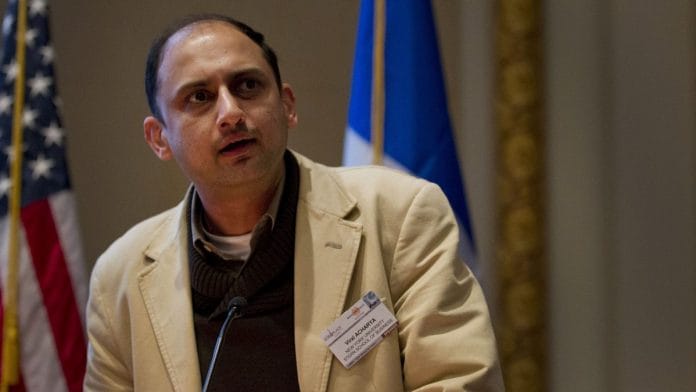New Delhi: A central bank should be allowed to say ‘no’ to the government as its actions are in public interest and not subject to the short-term political pressures faced by the latter, former Reserve Bank of India (RBI) deputy governor Viral Acharya said in an interview to ThePrint.
Acharya, who quit ahead of the completion of his tenure last year, said that some of the steps initiated by the central bank to ensure financial stability were diluted in the last couple of years.
Acharya’s book ‘Quest for restoring financial stability in India’ was released this month and it focuses on how fiscal dominance can impact financial stability.
In the preface of the book, Acharya has written how the RBI lost its governor at the altar of financial stability, referring to the abrupt resignation of then governor Urjit Patel in December 2018 after nearly a year-long clash with the central government.
The government did not favour the RBI’s stringent norms for stressed assets classification and its restrictions on lending by banks with weak financials. The government also wanted a larger pie of the central bank’s surplus. The dual regulation of public sector banks by both the government and the RBI was something the central bank opposed.
“Some of the steps that we were trying to put in place as the foundations of financial stability for the long-run were diluted in significant measure. But I think through our voice, through our dissent, through our resistance, through our exits, I think we have limited the extent of the damage that could have been inflicted,” said Acharya.
“We saved the day. We maybe didn’t win the test match, but we made it a draw rather than allowing a complete excess of credit and liquidity that had happened over the last decade,” he said.
Also read: Any govt unlikely to pursue meaningful privatisation of banks — ex-RBI governor Urjit Patel
‘Interests of central banks are aligned with those of people’
According to Acharya, “A central bank should be allowed to say a no (to the government). It wants to do the right thing. Its interests are aligned with those of the public. It has a very technocratic mandate of what it is supposed to achieve. It doesn’t face the short-term pressures that the bureaucracy and the governments face at specific points of the political cycle.
“There should be a healthy respect for the long-run thinking that the central bank typically employs,” he added.
Acharya pointed out that the institutions of the country are meant to serve the interests of the people over a long term.
“They cannot be allowed to come under short-term pressures as and when they arise… Rather than seeing this as resistance and lack of accommodation and compromise, I think they should pay some weight and attention on why the central bank may be taking a stand on this,” he said.
Need for decisive recapitalisation
Acharya advocated the need for decisive recapitalisation of state-run banks as well as privatisation of the healthier banks.
“We need banks to be able to take losses and for that they need to be well capitalised. But we solve the problem incrementally and don’t do decisive recapitalisation… A dialogue needs to be undertaken with the government to convince them to recapitalise banks, reduce their stakes and even re-privatise banks,” he added.
He also batted for significant fiscal reforms, including transparent fiscal accounting practices and an independent fiscal council.
Acharya also pointed out that the government has not adhered to fiscal deficit targets set under the Fiscal Responsibility and Budget Management Act, and will find it difficult to create fiscal space to provide a demand push to counter the impact of the Covid-19 pandemic.
He further said that the pandemic is a large shock and the government will need to put direct cash in the hands of the people to encourage them to spend. He said that banks will also need to facilitate efficient restructuring of the debt of corporations, who have experienced a hard revenue hit.
He, however, did not favour any regulatory forbearance in terms of capital requirements for banks.
“I am not in favour of regulatory forbearance. It is fine for a short period, but not for an extended period of time because it is just kicking the can down the road. That would be a mistake,” he said.
Acharya also pointed out that banks don’t have economic capital to withstand the losses they are facing due to both the legacy book as well as the future stress that they are expecting due to the pandemic.
Also read: As its last dissenter, Viral Acharya persistently questioned Modi govt over RBI’s autonomy







Not just the central bank should be allowed to say ‘no’, every other institution should have that right.
Saying yes or no agreeing or disagreeing with the elected government eventually leads to a decision.
If the decision goes wrong who is held accountable? THE ELECTED GOVERNMENT so the one who pays the price must have the final say.
No matter what the result so long as the elected leader is well meaning and credible people will understand his mistakes committed in good faith, so he will come back to power or it could end his political carrier.
While an un-elected decision maker always has the option of going back to his or her earlier carrier.